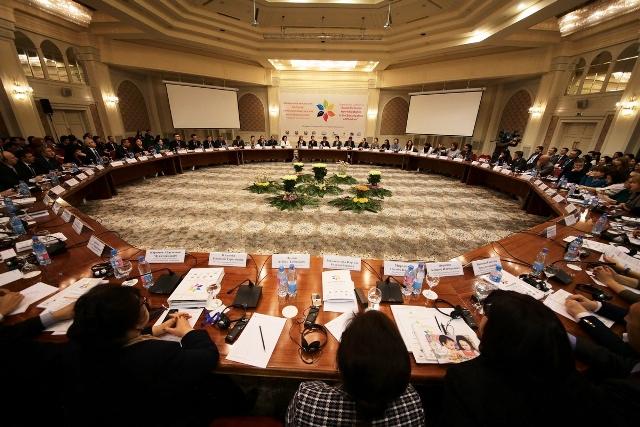The EU contributes to social inclusion of children with special needs in Uzbekistan

The international conference served as a platform for dialogue and exchange between local and international experts to develop effective national mechanisms in the area of the social integration and adaptation of children with special needs. Participants developed proposals designed to ensure access of these children to education, sport activities and community’s life. The conference participants also worked out proposals regarding vocational training for teenagers with special needs designed to contribute to their future social and economic inclusion in Uzbek society.
The Head of the EU Delegation to Uzbekistan, Ambassador Eduards Stiprais, also spoke at the conference. He briefed event participants on the EU contribution to support of children with special needs in Uzbekistan. His full speech is given below.
"Assalomu alaykum hurmatly do'stlar!
Dear conference participants,
Ladies and Gentlemen,
I'm delighted to attend this international conference focusing on social inclusion of children with special needs. This topic similarly important both for state and civil society in Uzbekistan, Europe, or elsewhere because we speak about our future.
First of all, let me commend the Government of Uzbekistan on their efforts designed to ensure social inclusion of children with special needs through providing respective legal framework protecting their rights and creating conditions for their wider access to various public services, such as education and healthcare.
The EU supports the Government of Uzbekistan in this area, and I would like to use this opportunity to brief you on how we do this. Namely, just recently has been completed the EU-funded project "Inclusive Education for Children with Special Needs in Uzbekistan". It was implemented between March 2014 and October 2016 jointly with the National Centre for Social Adaptation of Children with support of the Ministry of Public Education, Ministry of Health, Ministry of Finance, Oliy Majlis and other partner organisations.
During the period cycle a number of important goals have been achieved. Some of them could be called as “breakthroughs” on the way of the Uzbek educational system to become more inclusive for children with special needs.
For instance, the Draft of the National Long-term Strategy "On Inclusive Education in Uzbekistan", and the Action Plan for 2016-2018, which were developed and discussed with involvement of a wide range of national and European partners and experts. Moreover, further practical measures leading to approval of the Strategy at the governmental level were identified during their consultations.
The Draft Strategy developed by international experts from the EU builds a solid basis for further promotion of inclusive education system in the Uzbekistan. It will ensure respect for equal rights of any child to a quality education, adapted to his special needs, regardless of his or her sex, race, ethnicity, language, religion and social status, physical and mental development.
Let me describe in detail several of the key achievements of the project, which include but not limited to the following:
- The project provided access to inclusive educational services for 892 children with special educational needs in 24 pilot schools and in 24 pilot kindergartens, while the total number of beneficiaries reached 1500 children;
- Above 150 pedagogical experts have undergone special training on inclusive educational services;
- 3 modules mainstreaming inclusive practices in the local educational system have been approved;
- Pilot resource centres have been opened in 5 regions of Uzbekistan. They provided more than 2000 services for children with special educational needs and their parents, as well as consulted experts involved in development and application of inclusive educational services;
- More than 150 articles, 11 TV reports and 24 radio programs have been broadcasted to educate local public on the issues of social and educational inclusion of children with special needs;
- The project website www.inclusive-education.uz has been launched. It is accessible in 3 languages and serves a valuable tool for experts and parents of children with special needs.
- Finally, 8 project bulletins and five manuals explaining principles of inclusive education have been produced.
I could speak a lot how good this project has been, but rather let me quote several beneficiaries, who shared their feedback with the project team, when they discussed outcome of project activities:
“When my child studies with children without disabilities in an inclusive class she forgets about her own disabilities.” – a mother from Tashkent.
“Thanks to the project my 16 year old daughter comprehended that she is like any other teenager and she and her classmates shares the same interests and values” – a mother from Samarkand.
“At the beginning I was against that children with disabilities would be integrated in the same group at our kindergarten that my grandson attends. But I was wrong, now I see that it is was good idea to combine kids without disabilities with their peers with special needs. My grandson tells me every day how he has helped his classmates who need special care, or how they have played or studied something together, and I feel proud of his growing sense of responsibility and respect towards other people.” – a grandmother from Termez.
“My grandson, who couldn't speak before, begun to pronounce articulated sounds and even says clearly some words after he was placed in a kindergarten with an inclusive group.” – a grandmother from Namangan.
Ladies and Gentlemen,
Today we witness that social inclusion gradually becomes a part of life of the society in Uzbekistan, and I would like to congratulate everyone who made this possible – your dedicated state agencies and NGOs, enthusiastic experts, teachers, doctors and last, but not least, all loving parents and their children with special needs, who along with their peers without disabilities are future of this beautiful country.
I wish you all a fruitful exchange during the conference, and look forward to hearing your ideas on how we could jointly work to facilitate wider social inclusion of children in Uzbekistan.
E'tiboringiz uchun katta rakhmat!"
